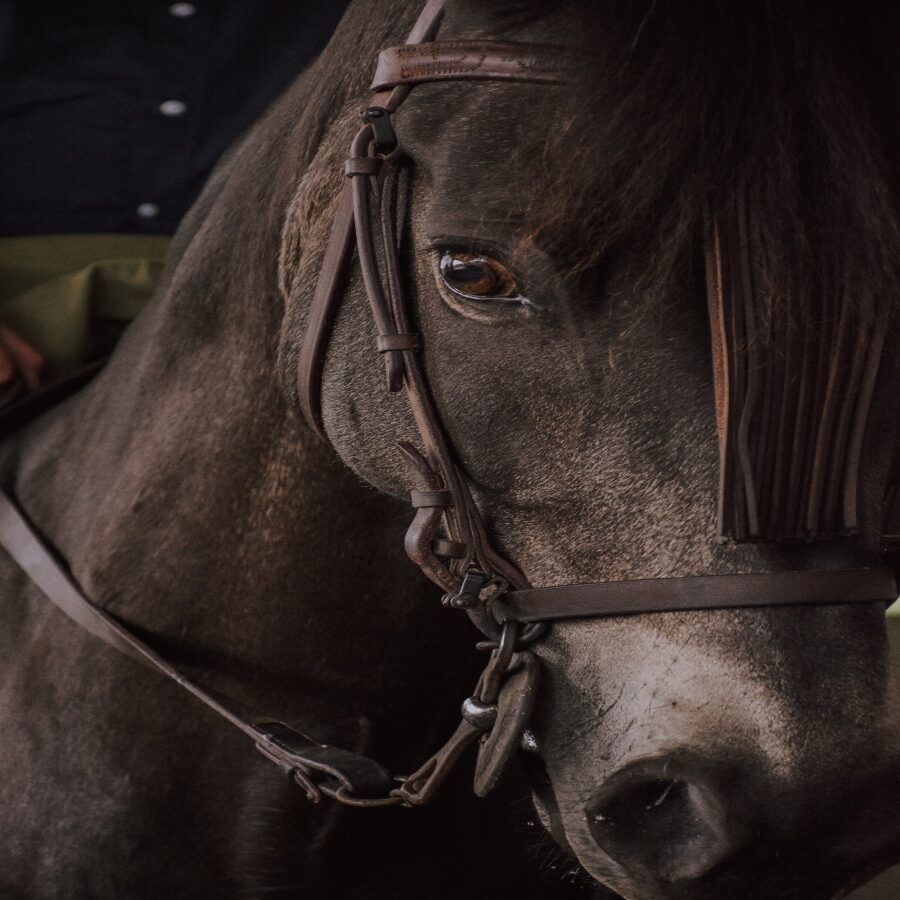
The Nights I Spend Reading to a Rescue Horse Named Emmeline
Monday
I am reading to Emmeline a story about a man who had no DNA.
He had severe radiation damage to his internal organs, this man, a nuclear power plant technician. His immune system was gone, the story says. His DNA couldn’t rebuild itself.
With blood in his tears, the man begged the doctors to let him die, but they kept him alive for 80 days. To try to save him, I tell Emmeline. To save and to study him.
To Emmeline — remember, it isn’t necessarily what you read, it’s how you read it, my equine therapist Maddie told me — I read the man with no DNA’s last words. I read them, or try to, in a soft, strong voice, as if I were exhaling without exhaling, admitting without admitting:
Now, no one can hurt me. Now, I can hurt no one.
As I look up from the page, I see Emmeline’s ears are forward, forward and flicking back and forth. Her eyes are electrically alert. But as she stands in her stall, I can’t tell if she’s looking at the ground or the sky. At me or through me. At something I can’t see. Or even imagine.
Wednesday
I am reading to Emmeline from a collection of confessions — Art confesses to sending an unsigned crush letter, Brad confesses to quiet quitting, Clara confesses a venal sin, etc. I try to read each of the confessions in a different voice, and all of them in a dam’s-about-to-burst cadence.
Like this one, from Patrice, who I hear with rain in her voice confessing a deep, abiding love: I told the one I love, “If you have something to say to me you feel you must say, even if you think it’ll hurt me, please tell me.”
And this one, from Telluride, who, in a confidently roundabout way, I imagine, confessed a truth: I knowingly hurt the one I love, knowingly and with knives out. On the regular.
As I read, I use my hands, I gesture, I make eye contact with Emmeline, or try to — remember to show her you’re present, that you’re engaged, Maddie said.
I’m present. I’m engaged. I’m here. And in this moment, I think about who I’ve hurt and who’s hurt me. I think about what I know and what I feel and what it’s like when I can’t tell the difference between the two. I think and think and think about the one I love.
I want to tell someone about this moment while I’m still in it.
I remember what Maddie said about a horse’s heart, how it’s ten times as big as mine, and there’s all this electromagnetic energy, and somehow your nervous system and the horse’s sync up, and she can feel what you’re feeling, feel it without freaking. How being in a horse’s presence can calm you.
Emmeline, I say, and Emmeline lowers her head — remember, when she does that, it could mean she’s relaxed and listening, Maddie said — and I say and say and say.
Friday
I am reading today’s paper to Emmeline. I’m reading it in a matter-of-fact, this happened today sources said voice.
I am reading a story about a guy who runs a traveling roadside zoo.
The guy says he’s rescued a range of animals abandoned by people who’d had yens for exotic pets. Lions. Tigers. Ring-tailed lemurs.
I give these animals a place to live, a place to be, the guy said to the reporter. Some people say I’m a hero. I don’t think I am, but if it weren’t for me, you know?
If it weren’t for me.
I don’t know that I should read this line matter of factly. I don’t know how to read this line, period. So I pause.
I scan ahead and see there’s a paragraph about the roadside zoo’s gift shop. There’s a photo of a ring-tailed lemur — Deirdre the Drive-Through Safari Lemur, the caption calls her — wearing a too-small sweater. The sweater says, “Born to Be a Photo Prop.”
I don’t know if I should be reading this story to Emmeline, who was rescued from an abandoned ranch in Montana that had served as a cult compound. They found her in a field, Maddie said. She was hurt. Hungry. She trusted no one.
Meanwhile, Emmeline’s listening, waiting for me. I can feel it in the darkness of this moment. And that’s good, or it’s supposed to be — remember, you’re helping Emmeline by letting her help you, Maddie said. But I’m afraid to look into Emmeline’s eyes. It’s suddenly very sad and very hard for me to hear this disembodied voice that is mine. Because I know Emmeline can see and hear and sense that it’s sad and hard. For me.
Are you OK with me reading this story? With me reading anything to you? I ask Emmeline in an undercurrent of a voice that unbuttons like a nightshirt. Are you OK with me, Emmeline? Are you OK?
Emmeline looks at me sideways — no, she isn’t looking at me at all. I don’t think she’s listening or waiting anymore. Maybe she’s imagining a field, in the gloaming, the sky a should without shoulders. Where how isn’t a number and why isn’t a question. Where every sequin isn’t a secret and every star isn’t a cemetery. Where abandonment is present, always, but doesn’t recur. Where rescues aren’t relived or rebranded.
Her head lowered, her tail swishing, Emmeline gently nudges the newspaper I hold in my trembling hands. She nudges me, more gently still.
Pat Foran would like to read to a rescue horse someday. His work has been published in various places, including Pithead Chapel, Reckon Review, and Wigleaf. He also received the 2021 Mythic Picnic Prize in Fiction. Find him at neutralspaces.co/patforan/ and on Twitter at @pdforan.
Submit Your Stories
Always free. Always open. Professional rates.
